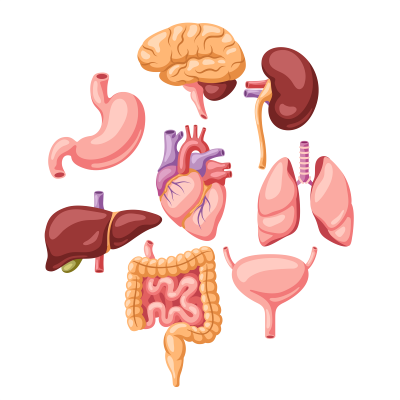Content may contain advertising or affiliate links.
Autophagy is a natural body process that breaks down and recycles damaged cell parts, acting on their behalf in response to nutritional deprivation or stress. This is primarily through temporary caloric restriction (fasting).

What Is Autophagy?
Autophagy is a process by which damaged cell parts are recycled or repurposed in order to keep a cell healthy and functioning optimally. Autophagy allows cells to digest proteins, waste products, and any other debris accumulating inside them. It allows them to use energy effectively, and create new cells by recycling old parts that have become redundant or broken down over time.
Autophagic reactions can be activated by various sources of stress such as starvation, oxidative stress or infection. Genetic mutations which reduce protein turnover or interfere with proteostasis increase susceptibility to autophagic degradation or aggregate formation and could also prompt autophagic reactions.
Autophagy’s most famous reaction is its destruction of glycogen to provide glucose for metabolic activities. Glycogen is first broken down in the cytosol by glycogen phosphorylase or debranching enzymes before being transported to lysosomes for degradation through autophagy. Degradation rates are controlled by pro- and anti-apoptotic signals with threshold set by BCL family proteins such as PUMA, NOXA, NIX and BID proteins regulating these reactions.
Autophagy in humans can be activated through physical exercise, caloric restriction, fasting and the keto diet, and has also been shown to protect against some chronic diseases. The intermittent fasting and autophagy connection is currently a popular topic for online searches. More research needs to be conducted into manipulating autophagy for therapeutic purposes.
Evidence supports autophagy as a key cellular mechanism for maintaining homeostasis during aging. Studies using animal models demonstrate how lack of autophagy shortens lifespan and is linked with various diseases associated with aging such as protein misfolding, mitochondrial dysfunction, neurodegeneration and hepatocellular injury. Conversely, increasing autophagy increases healthspan in these models and extends their lives accordingly.
Importance
Autophagy is essential to our bodies because it helps recycle our own cell parts. Cells form the basis of tissues and organs throughout your body. As they age or stop functioning normally, some become damaged and “junk”. Autophagy allows cells to disassemble this junk and reuse any salvageable pieces into new cell parts. This helps your body save energy and remain healthy in the process.
Scientists consider autophagy essential to healthy cell functions such as digestion, immunity and energy production. Furthermore, autophagy serves as an important stress response within our bodies.
Autophagy involves the production of phagophores that form around specific parts of your cells that have become waste, before merging with another part called the lysosome and being broken down and released back into your cell. The next action is the reviving any reusable bits from within it and maintaining consistent energy levels during times of nutrient deprivation. This process helps ensure stable energy levels during times of low nourishment availability.
Autophagy may play an integral part in preventing and treating various diseases. For instance, it’s thought to protect skeletal muscle against degenerative conditions by recycling its own waste products. There is also the possibility to increase cell resistance to oxidative stress and fight infections by eliminating invading bacteria or parasites.
Process
As we age, our cells lose the capacity for autophagy and its process slows down, contributing to diseases like Alzheimer’s and Parkinson’s. But studies have demonstrated that increasing autophagy through starvation or pharmaceutical agents such as rapamycin can extend lifespan in certain species of animals.
Autophagy involves several steps, such as the fusion of vesicles to form lysosomes and degradation and transport of damaged proteins for recycling back into useful components for cells. Autophagy helps protect the immune system by killing invading pathogens such as bacteria and viruses. In fact, mice lacking BECN1 or p62, two proteins known to promote autophagy, are more prone to Sindbis virus and herpesvirus infections.
Lysosomes break down large, damaged proteins like mitochondria into smaller components that can be recycled back into energy by cells. Lysosomes then deliver these molecules back to cytoplasm for processing by proteasome. This process is controlled by the mTOR pathway which regulates protein production and degradation
Autophagy not only recycles, but it provides other advantages as well, such as protecting neurons against neurodegenerative disease by clearing away misfolded proteins that accumulate and interfere with normal cellular function. Autophagy also supports immunity by clearing pathogens away, eliminating damaged organelles, and creating antibodies to fight disease.
Studies suggest a number of factors can have an effect on autophagy, including age, starvation, stress and genetics. Fasting activates autophagic responses that can be further stimulated through nutritional starvation and exercise. Furthermore, research indicates autophagy declines with age, while dysregulation may contribute to specific diseases.
Intermittent fasting may not be appropriate for everyone. This may include pregnancy, those with diabetes, and others with serious health conditions. In addition, it remains unclear when or if these methods will induce autophagy.
